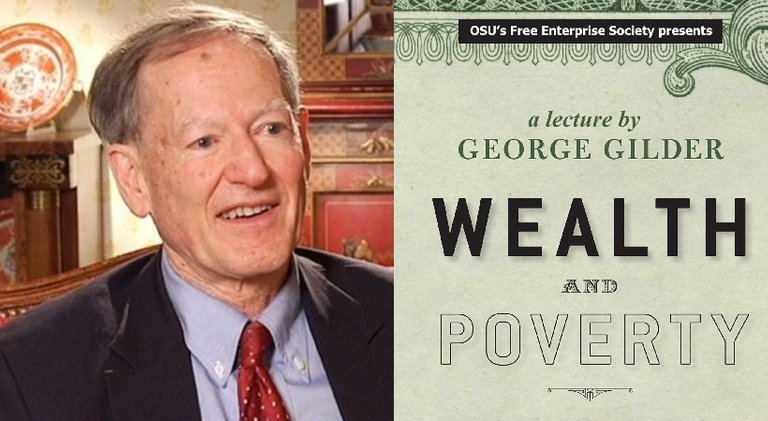George Gilder gave a lecture on Wealth and Poverty to students at Oklahoma State University (on November 2, 2022).

In his classic book on Wealth and Poverty, George Gilder explains the moral foundations of capitalism, how "capitalism is a system that begins not with taking, but with giving to others." He will expound on that concept in tonight's lecture.
The lecture was live-streamed via InsideOSU.com.
The archive link is here.
About the book (source):
Hailed as "the guide to capitalism", the New York Times best-seller Wealth and Poverty is one of the most influential economics books of all time. In this modern classic, Gilder affirms the moral superiority of free-market capitalism and explains why supply-side economics is more effective at decreasing poverty than government-regulated markets.
Gilder compares America’s current economic challenges with its past economic problems and explains why redistributive policies are doing more harm than good for the poor.
Making the case that supply-side economics and free-market policies are -- and always will be -- the answer to decreasing America’s poverty rate and increasing her prosperity, Wealth and Poverty offers solutions to America’s current economic problems and hope to those who fear that our best days are behind us.
About George Gilder (source)
Mr. Gilder pioneered the formulation of supply-side economics when he served as Chairman of the Lehrman Institute's Economic Roundtable, as Program Director for the Manhattan Institute, and as a frequent contributor to Arthur Laffer's economic reports and the editorial page of the Wall Street Journal. In the 1980s he also consulted leaders of America's high technology businesses. According to a study of presidential speeches, Mr. Gilder was President Reagan's most frequently quoted living author. In 1986, President Reagan gave George Gilder the White House Award for Entrepreneurial Excellence.
In 1986 Gilder was made a Fellow of the International Engineering Consortium. His deeper examination of the lives of present-day entrepreneurs culminated in many articles and a book, The Spirit of Enterprise (1986), which was revised and republished in 1992. The fact that many of the most interesting current entrepreneurs were to be found in high technology fields led Mr. Gilder, over several years, to study this subject in depth. In his best-selling work, Microcosm (1989), he explored the quantum roots of the new electronic technologies. A subsequent book, Life After Television, was a prophecy of the future of computers and telecommunications and a prelude to his book on the future of telecommunications, Telecosm (2000).
In 1993, Gilder made the following prediction: “The computer of the next era will be as portable as your watch and as personal as your wallet; it will recognize speech; it will navigate streets; it will collect your mail and your news ... It just may not do Windows. But it will do doors—open doors to your future.” [That was nearly 15 years before Apple launched its first iPhone.]
In his book, Life After Google: The Fall of Big Data and the Rise of the Blockchain Economy (2018), Gilder waves goodbye to today's Internet. In a rocketing journey into the very near-future, he argues that Silicon Valley, long dominated by a few giants, faces a “great unbundling,” which will disperse computer power and commerce and transform the economy and the Internet.